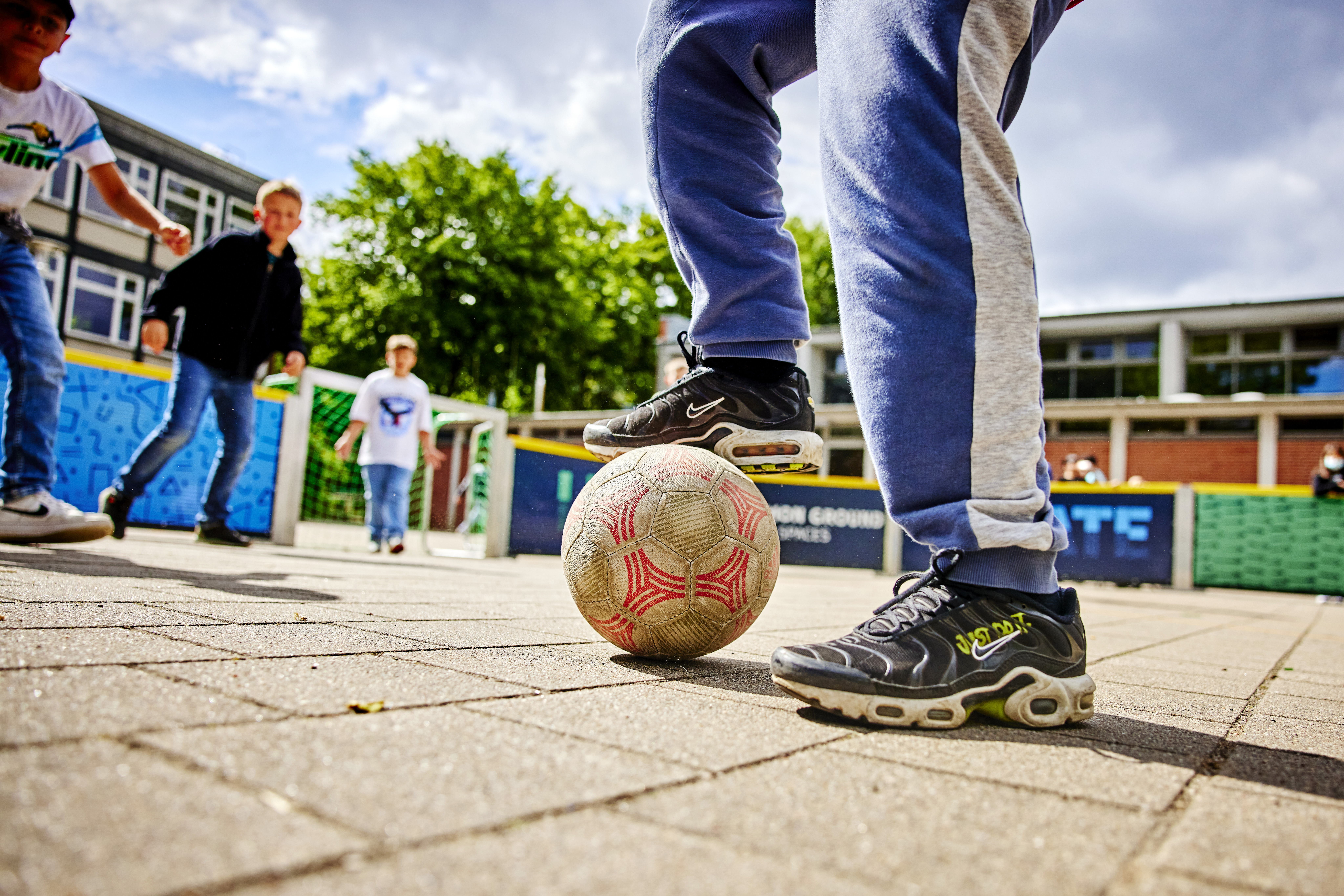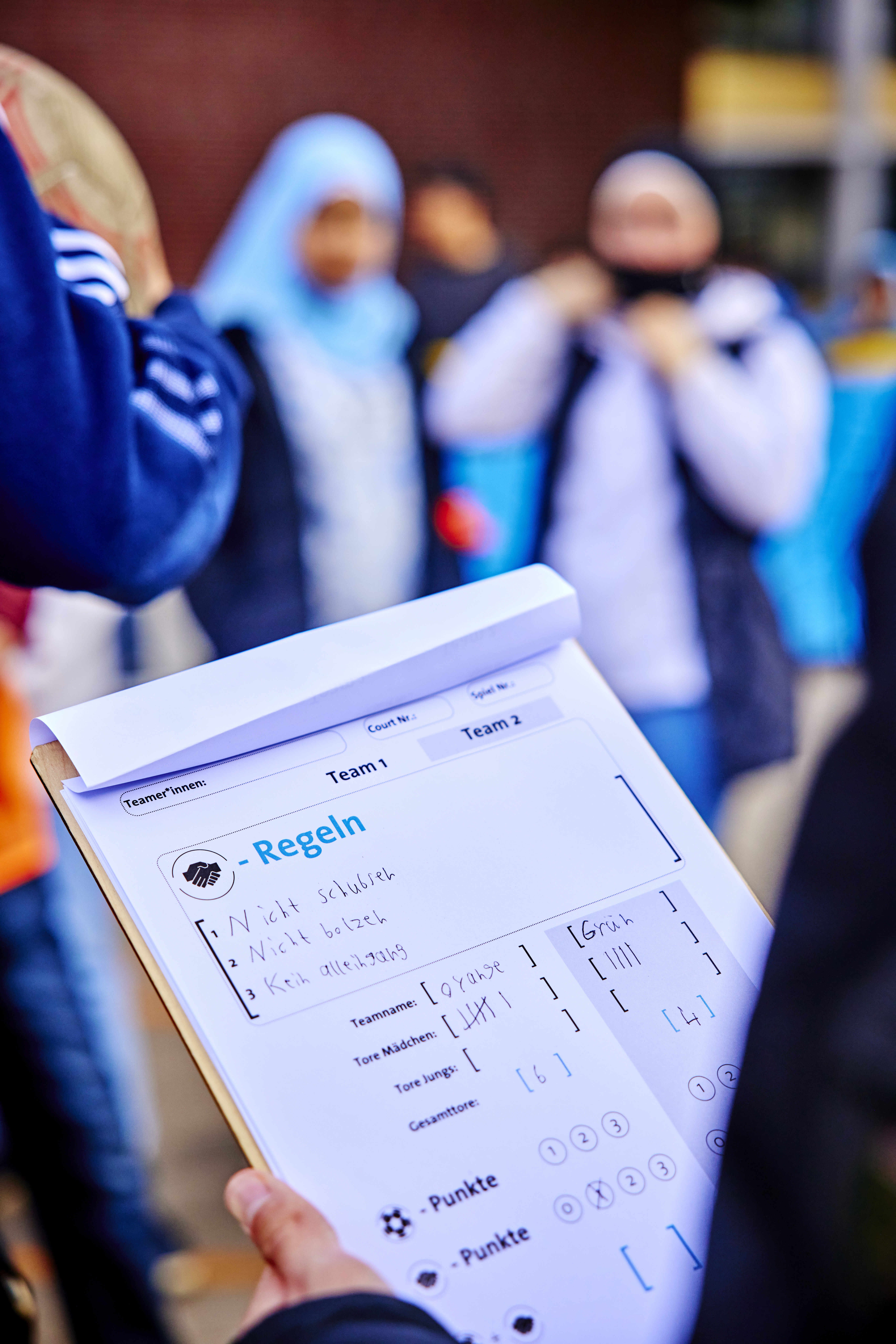Beyond the Game: KICKFAIR’s Three-Halves Model for Inclusive Education
With the KICKFAIR educational concept, students set their own rules—both in street football and beyond.
It’s a warm morning in May, and today, football is being played at FC St. Pauli's Millerntor Stadium. At first glance, there's nothing unusual about a football game in a stadium, but today is different. Three schools from different districts in Hamburg have come together for a street football tournament.

The participating 5th and 6th graders decide the rules themselves. There are no referees; the students manage everything on their own, from moderating the event and choosing the music to organizing the tournament. Teachers are present, but only as spectators, observing how well the students handle everything, including the warm-up game of "Rock, Paper, Scissors." In this game, two children play against each other, and the winner moves on to the next round while the loser becomes the previous winner's cheerleader.
This continues until one child is left standing, cheered on by everyone, without arguments or hard feelings. It’s particularly notable considering that these are boys and girls who, at times, engage in conflicts or even fights in the schoolyard. But today, everything is peaceful—not just during the warm-up, but throughout the event. This harmony can be attributed to KICKFAIR, an educational project that, in collaboration with the #CommonGround24 campaign, organized this tournament.
KICKFAIR is a non-profit organization founded by Ashoka Fellow Steffi Biester in 2007. The idea is simple yet powerful: through street football, young people learn important values and skills like fairness, teamwork, and conflict resolution in a playful manner. They learn to take responsibility for themselves and to work together on an equal footing.
The key concept here is the "three halves" principle. In the first half, participants decide on the rules by which they will play in the second half. The third half is for reflection: what went well, what didn’t? It’s a straightforward approach but significant in that it puts young people at the center, valuing their ideas and perspectives, and allowing them to take responsibility.
This principle extends beyond the playing field into educational processes and school culture. Students can choose various roles—be it in the organizational team, as mediators, or as moderators—and they are encouraged to grow into these roles.
This emphasis on experience and passing it on takes time, and both the project and the schools involved provide it. For instance, students who first encounter the program in the 5th grade as players may go on to organize tournaments for younger students in subsequent years, eventually becoming youth leaders who also work with KICKFAIR outside their own schools.

Today, youth leaders from all over Germany are here, organizing the tournament in Hamburg along with students from Max Schmeling District School and Ilse Löwenstein School. One of these youth leaders is 19-year-old Jarron Denkler, who traveled five and a half hours from Erlangen to Hamburg to participate. He was introduced to KICKFAIR as a student a few years earlier.
"Before KICKFAIR, I was a very shy person and didn’t talk much. Through the project, I learned to connect with others, and now I love giving something back to younger kids," says Jarron. He adds that the KICKFAIR principles have become a part of his everyday life: "It's about mutual respect. It doesn’t matter if someone is 20 years older or five years younger; I meet them on equal footing and take their opinions seriously. No one is above or below anyone else."
While Jarron's former school has integrated the three-halves principle into its entire curriculum and learning process since 2013, the Max Schmeling District School, participating in today's tournament, is just beginning its KICKFAIR journey. Two teachers, Adrian Wagner and Enrico Wessoly, introduced the program to the school two years ago. The school, which has a KESS factor of 1 (indicating a student body with limited opportunities and often facing social exclusion), uses street football to offer students new perspectives on themselves and others.
At the district school, this alternative looks like this: up to 25 students from grades 8 and 9 can choose a KICKFAIR profile, where they spend weekly profile days playing football, discussing self-made rules, and applying field experiences to current school issues and conflicts. This approach empowers them to take part in decision-making and to develop their own solutions.
The two teachers have already noticed positive changes. For example, during a dodgeball tournament, a dispute arose among 5th graders, but the 8th graders with the KICKFAIR profile naturally stepped in to mediate, without the teachers having to intervene. "While KICKFAIR provides a lot of freedom, it is not without rules. But the students decide for themselves what they want to adhere to, and that makes all the difference," says Wagner. Wessoly agrees: "The students learn to take responsibility, get involved, and stand up for their values through the three-halves principle. A tournament like today takes them a step further. That’s how they grow."

As the tournament at Millerntor draws to a close, the final teams—Team Pink and Team Green—sit together in the shade, discussing whether the rules they set, like no pushing or kicking and helping each other up, were equally observed. In terms of goals, Team Pink leads 2:1. Both teams agree that while there were infractions on both sides, there were also many helping hands. In the end, both teams decide to award each other all three fairness points, resulting in a 5:4 win for Team Pink. But in a tournament like this, the score is the least important thing.